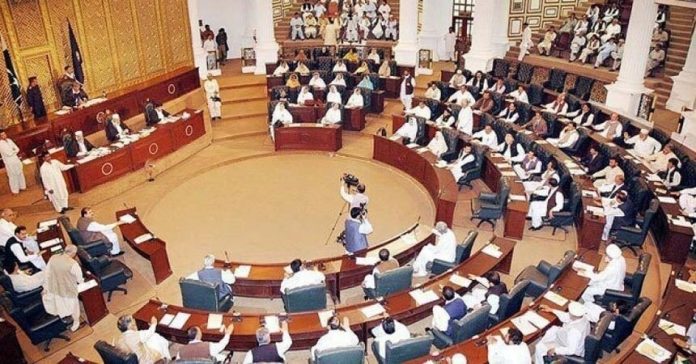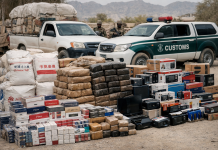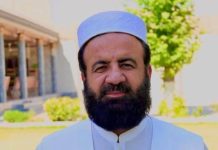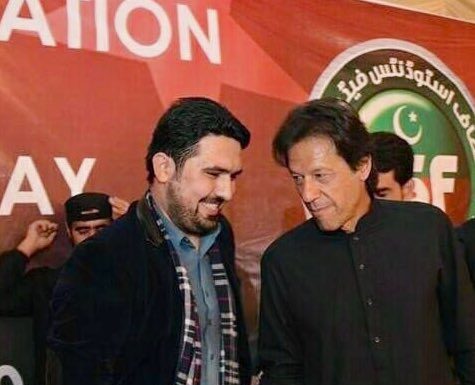Ashrafuddin Pirzada
PESHAWAR: The Khyber Pakhtunkhwa government of Pakistan Tehreek-e-Insaf announced Wednesday that a bill on protection of journalists would be tabled in the provincial assembly to combat impunity for crimes against media and its practitioners in the province.
“The provincial government will table the bill on safety of journalists in the Khyber Pakhtunkhwa Assembly soon,” Muhammad Ali Saif, advisor to KP Chief Minister Ali Amin Gandapur on information, told a conference on “Safety of Journalists in Merged Tribal Districts” held by Freedom Network to launch its report on the impact on media in the tribal districts of five years of merger of ex-FATA into Khyber Pakhtunkhwa.
Barrister Saif agreed to work with an Action Committee, set up at the conference, to discuss proposals to include in the bill. The Committee includes presidents of the Khyber Union of Journalists, the Peshawar Press Club, the Tribal Union of Journalists and the Pakistan Journalists Safety Coalition.
The 92-page report launched on the occasion, authored by Aurangzaib Khan, noted that the press freedom situation and safety of journalists in tribal districts did not improve in the last five years since the erstwhile Federally Administered Tribal Areas were merged in Khyber Pakhtunkhwa.
The report “Newstribes of Northwest – Saving Journalism in Pakistan’s Tribal Districts” was released at a meeting of the Pakistan Journalists Safety Coalition PJSC-Khyber Pakhtunkhwa chapter in Peshawar on Wednesday.
“In 2006, the government wanted journalists to take measures for their safety. In 2014, journalists were losing sleep for want of peace. In 2023, they are back to square one. One or the other party to the conflict is unhappy with media in tribal areas,” the report said.
KP Minister for Religious Affairs Sahibzada Muhammad Adnan Qadri told the conference that the safety challenges of journalists “are the same that residents of tribal districts face which means everyone should work together to resolve the security challenges.”
“This report aimed to understand how the political mainstreaming of former tribal areas impacted the tribal media and its practitioners. It addressed two questions: state of freedom of expression and safety of journalists,” Iqbal Khattak, Executive Director of Freedom Network told the meeting.
The report said: “Not much changed on both counts.” It added: “The merger did not strengthen media. It strengthened tribes, Maliks or elders and warlords. The merger did not strengthen the rule of law, the media, or its practitioners.”
Return of militancy sparked “calls for peace and state suppressed freedom of expression not allowing media to report these calls,” the report said about an undeclared official ban on media to report a citizens’ movement for fundamental rights.
“Space for media and journalism has shrunk drastically in the merged districts after the resurgence of Tehreek-e-Taliban Pakistan(TTP),” the report underlined suggesting that political integration helped media little to free from state and non-state actors’ threatening behaviours.
Increasingly, the report highlighted, journalists “do not proactively but wait for institutions – the administration, the ISPR – to release information to them. We do not take risks ourselves to probe or push for information. By now we are all clear about what our limits are,” interviews with around 50 tribal journalists and the report author’s visits to all tribal districts concluded.
“Self-censorship is rampant. Local stories get censored,” these journalists spoke of limited freedom to report from the most troubled parts of the country, particularly in Landikotal.
Visibly traumatized, these journalists cope with tribal traditions, coupled with official backing and interference also as tribal Lashkar might expel a journalist and impose a fine if any report was seen against the (Rawayat) or tradition. “Same mindset still prevails which was under the FCR” or Frontier Crimes Regulations law, the report warned.
Ban on media to report freely from merged districts brought technology to use with social networking applications and helped citizens from these districts to be heard. However, the frequent shutdown of the Internet forced journalists to travel back to nearby cities to file their stories.
Gender in media was grossly disproportionate or merely symbolic. Women journalists are reporting merged districts but they mainly live in bordering districts for safety reasons.
A resolution was also passed at the meeting calling on CM Ali Amin Gandapur-led provincial government to urgently table a bill on protection of journalists to combat impunity for crimes against journalists in Khyber Pakhtunkhwa.
Khyber Union of Journalists President Nasir Hussain, Peshawar Press Club President Arshad Aziz, Tribal Union of Journalists President Qazi Fazlullah and PJSC-Khyber chapter President Saiful Islam Saifi also addressed the conference.
It may be noted here that a Landikotal press club former journalist was gunned down by unidentified gunmen in Landikotal last week while the lives of the rest of the journalists were in Denger. Several were warned of dire consequences for their reporting. Soon after the Khalil Jibran murder TTP issued pamphlets warning district Khyber journalists for their reports. Journalists demanded protection from the state but their appeal couldn’t heard seriously.











